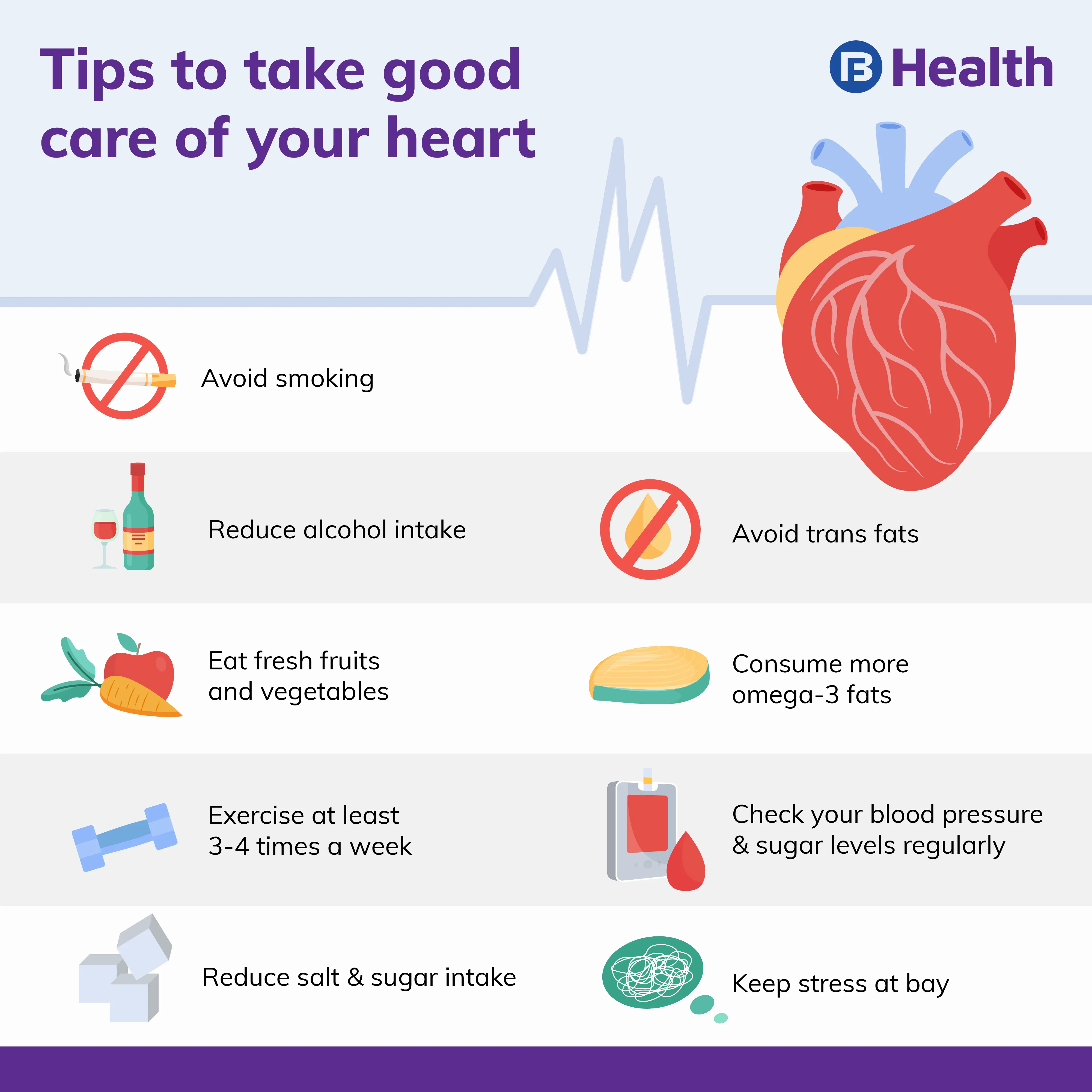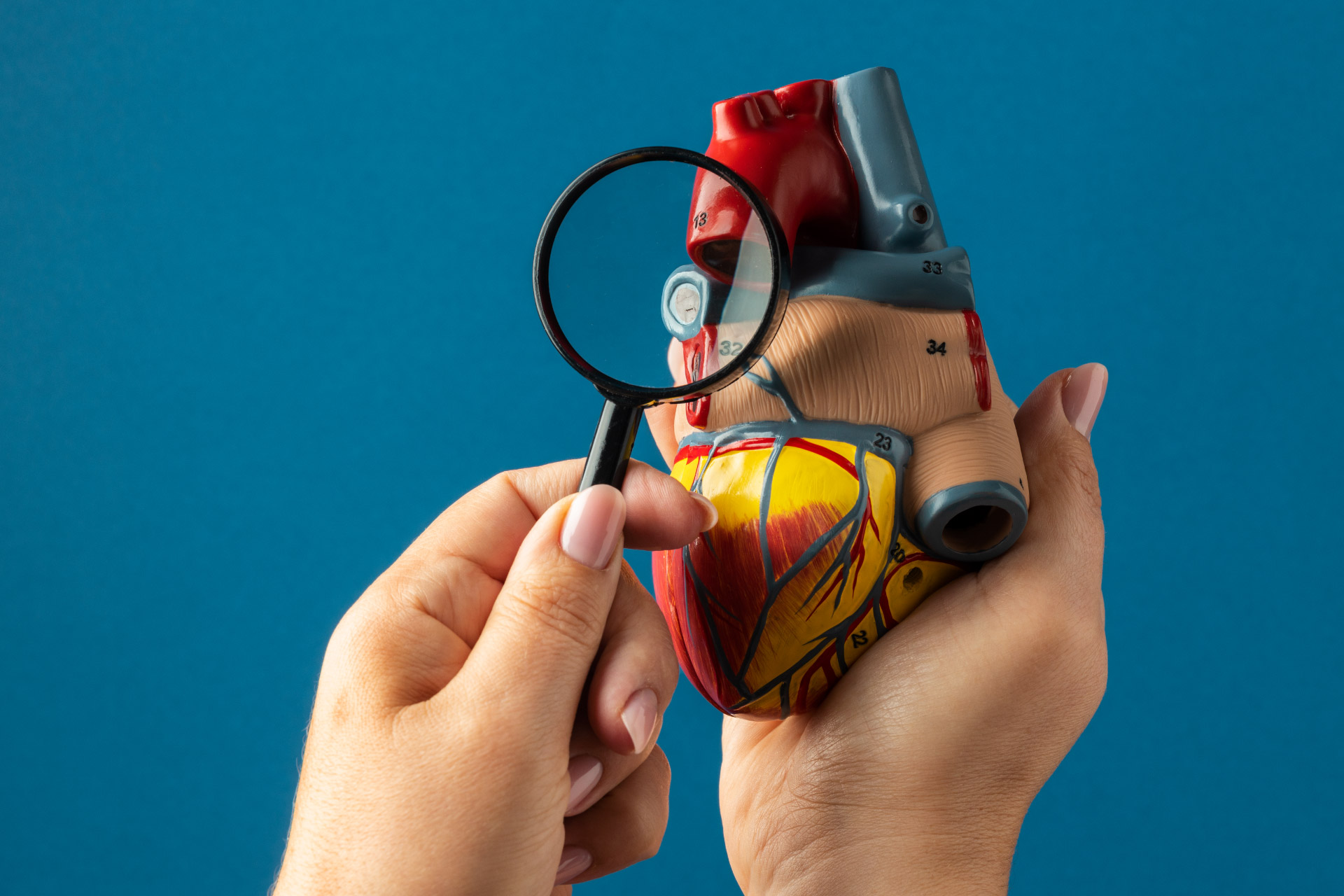Cardiologist | 5 min read
11 Lifestyle Tips to Maintain a Healthy Heart
Medically reviewed by
Table of Content
Key Takeaways
- Signs and symptoms of heart problems to watch out for
- Different types of tests for diagnosing heart conditions
- Lifestyle tips to maintain and improve your heart health
Is your heart healthy? Can you run up the stairs without panting? What can you do to keep your heart happy and healthy? If you’re seeking answers to these questions, read on to know more.
Genetics and heart disease
Genetics can play a big role in causing your heart condition, which means, if heart disease exists in your family, then you run a higher risk of developing one. You can inherit, from your parents or grandparents, conditions such as heart disease, high blood pressure and other heart related issues. These combined with damaging lifestyle choices, such as consuming excessive alcohol, smoking, stress and an unhealthy diet can lead to serious heart problems.
Additional Read: Heart test types to keep in mindSigns and symptoms of heart problems to watch out for
Some of the most common signs of heart problems include:
- Chest pain, tightness or discomfort in the chest
- Shortness of breath
- Dizziness or fainting spells
- Racing heartbeat (tachycardia) or slow heartbeat (bradycardia)
Types of heart disease
Heart disease includes several conditions and a range of cardiovascular problems. Some of the types of heart disease include:
- Arrhythmia, which is an abnormal heartbeat condition
- Atherosclerosis, which is the hardening and narrowing of the arteries
- Cardiomyopathy, which causes the muscles of the heart to grow weak or harden
- Congenital heart defects are heart irregularities present from birth
- Heart infections such as endocarditis or myocarditis
- Coronary artery disease (CAD) or ischemic heart disease occurs because of plaque build-up the arteries

Easy ways to check your heart health at home
- Check your heart rate with a fingertip pulse oximeter: Your resting heart rate should be between 60 - 100 beats per minute (bpm), and when exercising it can go up to 130 - 150 bpm or higher.
- Stairs test: Give yourself a quick heart check up by climbing four flights of stairs, and if you can do this within 60 to 90 seconds it indicates good heart health.
- Aerobic exercise: If you are easily out of breath or feel lightheaded with a small amount of aerobic exercise this is a sign that there may not be enough oxygen travelling to your muscles. This means the heart is not able to pump oxygen adequately.
Different types of tests for diagnosing heart conditions
Some of the tests that your doctor can ask for in order to check heart health include:
- Exercise stress test
- Chest X-rays
- CT scan
- Electrocardiogram (ECG)
- Echocardiogram
- Transesophageal Echocardiogram (TEE)
- Angiogram or angiography
- Magnetic Resonance Imaging (MRI)
How often should you have a heart check-up?
You should consult your doctor for screening for heart diseases after the age of 20, especially if heart disease runs in your family. The frequency of check-ups will depend on the diagnosis of your heart health and risk factors you face. You can also have your blood pressure (BP) checked once every couple of months and if this is 120/80mm Hg or slightly lower, which is normal, you can have a heart health checkup done once every two years. You can also check your cholesterol levels every 4 to 6 years.
Additional Read: List of foods that should be part of your heart healthy diet11 lifestyle tips to maintain and improve your heart health
- Reduce salt intake: A diet which includes more salt than necessary leads to higher blood pressure, which increases the risk of heart disease. Reduce the amount of salt in your food and also check ingredient labels when it comes to processed foods as 0.6g sodium per 100g are on the high side and should be avoided.
- Consume less sugar: Excessive sugar leads to weight gain, which can affect your BP, cause diabetes and heart disease.
- Limit saturated fat: Saturated fats that are found in dairy fats, butter, ghee, and processed foods such as biscuits and cakes, tend to increase cholesterol levels. Avoid processed foods, make the switch to skimmed milk, and milk alternatives such as almond, cashew or soy milk, and grill or steam instead of frying.
- Load up on fruits and veggies: Potassium helps lower BP, and fruits and veggies rich in soluble fiber also help reduce your cholesterol. So, include about five servings of fruit and vegetables in your daily day.
- Get Omega-3 fats: This is considered beneficial for your heart health because it improves your cholesterol levels. Oily fish such as mackerel, salmon and fresh tuna are packed with omega-3 fatty acids, and vegetarians can get omega-3 fats from walnuts, spinach, flaxseed and flaxseed oil, and pumpkin seeds.
- Control portion size: Serve up your meals in a small bowl or plate to limit your portions. Additionally, ensure you consume more fruits and vegetables in your daily meals that are high in nutrients and low in calories. Simultaneously, keep away from foods that are high in sodium and calories.
- Eat whole grains: Whole grains are great sources of fibre and they play a role in regulating BP too. Use whole-wheat flour and wholegrain bread, switch to wholewheat pasta and brown rice, and include oats in your diet.
- Kick the butt: Smoking is a leading cause of cardiovascular disease. It damages the arterial lining, reduces the amount of blood oxygen levels and raises your BP.
- Reduce alcohol intake: Excessive alcohol can affect your heart by causing high BP, abnormal heart rhythms and damage to the heart muscle.
- Get in some exercise: Research has shown those who exercise have lower chances of heart attacks than those who don’t. Try and get a total of at least 150 minutes of moderate intensity workouts to lower your risk of heart disease.
- Avoid stress: Stress can cause issues such as poor blood flow to the heart. Reduce your stress levels by way of meditation, yoga, reading a book, listening to music, etc.
Keep these tips in mind for a healthy heart and address your heart health using the handy Bajaj Finserv Health App. With it you can book appointments with the best cardiologists near you in seconds, choosing in-person or video consultations. You can also get access to health plans to avail deals and discounts from partner clinics and labs. Download the free app from Google Play Store or the Apple App Store today and get started on exploring its many features.
References
- https://www.ncbi.nlm.nih.gov/pmc/articles/PMC3319439/
- https://www.sciencedaily.com/releases/2020/12/201211083104.htm
Disclaimer
Please note that this article is solely meant for informational purposes and Bajaj Finserv Health Limited (“BFHL”) does not shoulder any responsibility of the views/advice/information expressed/given by the writer/reviewer/originator. This article should not be considered as a substitute for any medical advice, diagnosis or treatment. Always consult with your trusted physician/qualified healthcare professional to evaluate your medical condition. The above article has been reviewed by a qualified doctor and BFHL is not responsible for any damages for any information or services provided by any third party.





